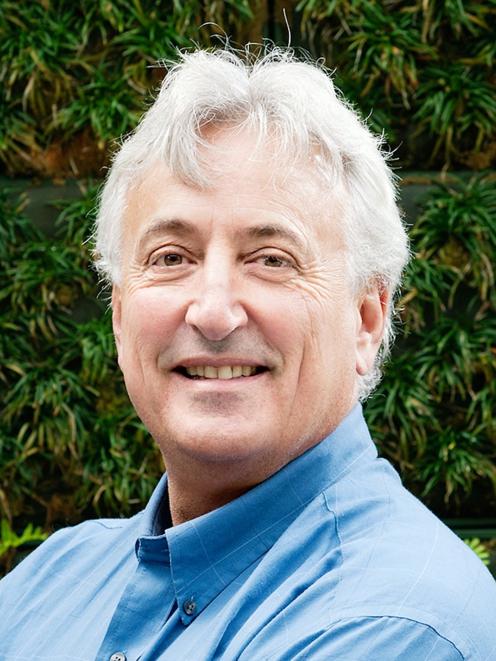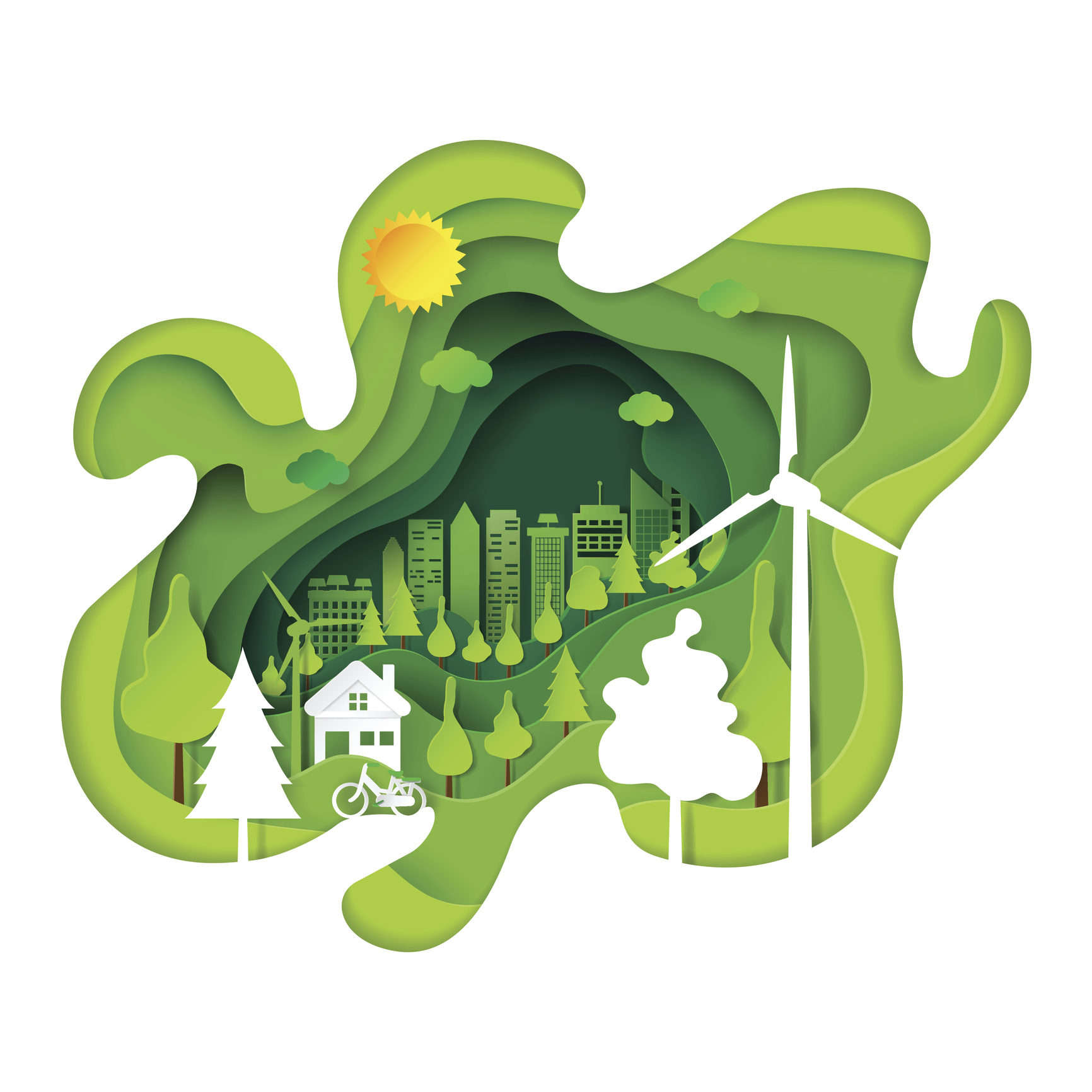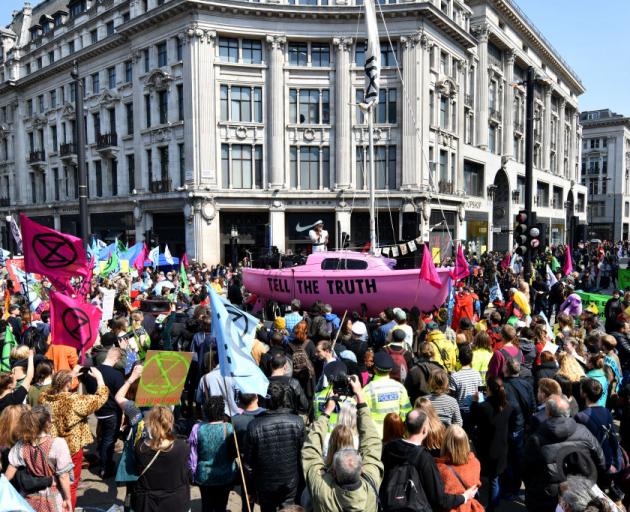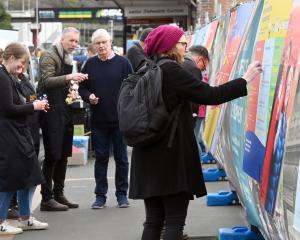
We have an addiction we need to shake, Prof Robert Costanza says.
And it's not Married at First Sight, carbs or internet memes. Though they may be implicated.
It's growth. Not all growth. Our children are OK to continue putting us to the expense of new shoes.
It's the economic growth our society has raised to the highest pedestal.
Here's the problem with it. If an economy grows at 3% a year, probably enough to get most democratically-elected governments a second and third term, it is on track to be a third larger in just 10 years. Keep it up for 25 years and the size of the economy has doubled.
That may not mean double the inputs, given productivity gains, but it will mean a society's footprint has become significantly larger in a very short space of time.
The strain is beginning to show in a world now full, the professor says, in the shape of climate change, biodiversity loss and nitrogen pollution, in particular. Tipping points beckon.
Prof Costanza is a long way from being alone in questioning the growth addiction.
Among those pointedly critical is Dr Jason Hickel in a short video archived at the WeAll website - with which Prof Costanza is associated - who says it is killing us.
"Right now, the entire global system is captive to a single idea, economic growth,'' the anthropologist at the London School of Economics says.
"Politicians rise and fall on their ability to increase GDP year on year.''
And yet, Prof Costanza says, not only is the obsession with growth and GDP doing us few favours, it is not even necessary.
"By analogy with all the other organisms on the planet, including our own bodies, growth is important in the early stage, but at some point organisms stop growing and continue developing,'' he says.
"We have to distinguish between growth, increasing physical size, and development, improving the quality of the system. We really do want sustainable development, if you take it in that context of improvement in quality.''

SO, what to do?
Well, Prof Costanza, who was in Dunedin last week as a guest of the University of Otago Catchments Otago research group, recommends an intervention. The sort of intervention you might make for someone with an addiction problem, whether substance abuse or a too-fond relationship with the pokies.
Specifically, a motivational interview, a tried and tested approach to addiction counselling.
What a motivational interview avoids is confronting the patient with the dire consequences of continuing their behaviour.
Instead, it initiates a discussion about life goals. So in the case of growth, the patient - that would be us - identifies what's really important to them. With the expectation that they - we - would be unlikely to place a slavish devotion to economic growth anywhere near the top of the list.
From there, Prof Costanza says, it's a 12-step programme to rehabilitate other human values and put our recovering addict on a road to a more sustainable lifestyle.
Critically, that new lifestyle will be one that takes into account a much wider and richer set of considerations when measuring success.
Prof Costanza is an ecological economist and systems thinker. He has a vice-chancellor's chair in public policy at the Australian National University, alongside a long list of international fellowships, including at the Stockholm Resilience Centre in Stockholm, with which he has worked on the monitoring of planetary limits.
As a systems thinker, and someone with a particular concern for the strain our species places on the environment, Prof Costanza has been involved in the development of the idea of ecosystem services.
It's an idea that cuts across conventional measures of the economy and GDP by demanding that a much broader data set be employed when judging progress.
The concept of ecosystem services - all the benefits bestowed on us by natural systems, from climate regulation to water supply and pollination - was first valued by Prof Costanza and others in a lead article in the journal Nature in 1997.
The figure they came up with was $US33 trillion, larger than global GDP at the time.
Placing a value on them meant initiatives that might normally be regarded as contributing to GDP could now be weighed against what might be lost if the activity impacted on ecosystems.
For example, if a wetland, playing a key role in water quality and biodiversity, was converted to pasture, GDP, as normally accounted, would rise. But if a more holistic approach was taken, would that still stack up if measured against the loss of ecosystem services?
In Prof Costanza's thinking, our reformed addict is unlikely to reckon so.
A study out of Cambridge University, with which Prof Costanza was involved, underlines the point.
The study, in 2002, found a worldwide network of nature reserves on land and sea would cost about $US45billion a year to maintain. But the loss of natural goods and services if those habitats were wiped out would have a value of between $US4.4trillion and $US5.2trillion.
That, Prof Costanza says, is a benefit to cost ratio of 100 to one, no-one else gets that sort of return on investment, with the possible exception of fossil fuel lobbyists in the US.
While in the South, Prof Costanza met with Catchments Otago researchers, Environment Southland representatives and various other community representatives to talk about what an ecosystem services view would mean for how natural capital in the region might be managed.
In particular, the focus was on the Aparima catchment in Southland and how ecosystem services science can support the management of marine and coastal ecosystems.
Systems thinking then, the stuff Prof Costanza does, is about taking the blinkers off so we can see a more complete picture, how the whole system functions and where the interconnections are. We need more of that, he says.
"We have built all these silos, around disciplines, around government departments, around different aspects of life and in fact that gets in the way then of solving problems that cross those boundaries,'' he says.
"The big issues I think we are facing go across those boundaries, so we have to learn how to tear down those walls or at least build bridges.''
It's becoming even more important now we are in the Anthropocene - the geological age defined by human impacts on the climate and environment.
"If you go back 1000 years, what people did in one part of the world didn't really affect the climate or the functioning of the system or what people in other parts of the world are doing. Now it is a big interconnected global system,'' Prof Costanza says.
What we do today is having a critical impact on life supporting systems.
It's not a new idea.
The economist and philosopher Kenneth Boulding talked in the 1960s about transitioning away from the cowboy economy to the spaceship economy, Prof Costanza says.
"So we have to start thinking of the planet as our spaceship, we have to maintain and manage it in a way that is going to allow us to survive.''
We first have to understand how Boulding's spaceship works, and how it supports us all, then how to manage it in a way that will allow it to continue.
We'll need to learn more about what contributes to people's wellbeing, physically and mentally, beyond simply ever expanding material consumption.
"The way the system functions, most of the growth in GDP is going to a very small fraction of the population, so the average person is not seeing any of those benefits anyway,'' the professor says.
Even in straight economic terms it is not working.
So back to that 12-step programme and finding out what we really value.
"The first step in the motivational interview process is to re-establish what our fundamental goals are. The challenge there, is how do we engage the whole of society in that discussion?'' Prof Costanza says.
We are not yet having that discussion, though it should be the essence of a democratic society, building a shared vision, he says.
The direct democracy of something like Vermont's Town Meeting Day might point the way.
For more than 200 years, on Town Meeting Day, citizens in Vermont come together in their communities to discuss the business of their towns.
We need to do that at scale, Prof Costanza says.
The likes of the United Nations Sustainable Development Goals (SDGs) are a step in the right direction, he says.
The 17 goals, agreed by the assembled nation states in 2015, for the year 2030, include things like "decent work and economic growth'' (goal eight) alongside "no poverty'' (No.1), good health and wellbeing (No.3), gender equality (No.5) and reduced inequalities (No.10), responsible production and consumption (No.12), and climate action (No.13).
"We need to take that process much further and much deeper,'' Prof Costanza says.
Maybe have a competition, to replace American Idol.
"I am convinced if you did that you would get a future that was more equitable.''
Just how inequitable things have become many surprise many, he says.
A piece of research from 2011 suggests as much. More than 5000 Americans were asked to guess how much wealth each fifth of the population had. Then, how much each fifth should have. They guessed the top fifth owned about 60% of the wealth and that the bottom 40% had about 10%. In fact, the top 20% owned more than 84% and the bottom 40% just 0.3%.
Just as strikingly, the ideal distribution identified by the survey was that the top quintile would own just 32% and the bottom two 25%.
American reality is not a good place to be, Prof Costanza says.
Richard Wilkinson and Kate Pickett's book The Inner Level describes the way in which inequality causes a bifurcation between depression or narcissism. Either you give up or decide you are a superhero.
A society-wide conversation would probably agree that, alongside a greater level of equality, we want a stable climate, a stable environment, Prof Costanza suggests.
"All the things that are included in the SDGs I think the vast majority of people, if asked, would prefer - a world that was more like that, than the one towards which we seem to be headed.''
Prof Costanza says the looming threat of environmental tipping points means we need to change quickly.
An initiative with which the professor is involved, WeAll - the Wellbeing Economic Alliance - is trying to catalyse positive change, by sharing positive new narratives "underpinned by a strong and coherent knowledge and evidence base''.
"That's what WeAll is about, trying to build that narrative more clearly.''
Its targets include not just governments, but the creative sector and wider society, with the aim of fostering co-operation.
"It really is all, not just some.''
The trigger for the sort of change Prof Costanza says we need to see could be when people recognise that all of these things are interconnected.
"Climate is not a separate problem, climate is a result of our addiction to growth, our reliance on fossil fuels, our inability to incorporate those warnings into changing behaviour. It is also responsible for rising inequality and the social problems that brings and the other impacts on the natural environment, our sense of community, so it gets back to the systems view - it is all interconnected, there is no one right thing.''
Bringing it all together means recognising we are all heading over a cliff together, but also that there is a better way.
"For the general public it is going to be quality of life and general wellbeing. That their lives are going to get better if we make the kind of changes we are talking about. It is not a sacrifice to make these changes. It is often presented as, `well we can solve the climate problem but we are going to have to stop doing all the things we are doing - it will be a sacrifice but we can do it'.
"I think it is the opposite, I think it is a sacrifice not to make these changes.''

A new democracy mooted
A radical new form of democracy might be required to guide us towards a more sustainable footing, Prof Robert Costanza says.
The systems thinker and ecological economist says vested interests, particularly the fossil fuel industry, have frustrated the shift to a more sustainable footing, and been successful because of their ability to lobby politicians.
"I think one sector of society that is really standing in the way of making this transition is the fossil fuel sector. Business in general, the business community, other than the extractive sector, I think is very much on board with these ideas.''
A lot of the assets of the extractive sector will be stranded, worthless, if society moves decisively towards clean energy as part of a response to climate change, he says.
"So you can see why they are trying to protect their current status and way of life.''
One of the reasons they have been able to stay in the game, even in situations where clean solar and wind energy are cheaper, has been continued subsidies for fossil fuel, he says.
Reforming the political system and removing money from politics would help address that.
"One somewhat radical proposal in that regard is what is called deliberative democracy.''
Under that system, representatives are randomly chosen from the population, so that they are genuinely representative and uncorruptible.
There have been experiments with it, citizens' juries for example.
"They build a shared vision, and that's the democratic process that we're talking about,'' Prof Costanza says. "Often their policy decisions are more democratic but they are also probably better decisions in terms of the wellbeing of the whole society.''













